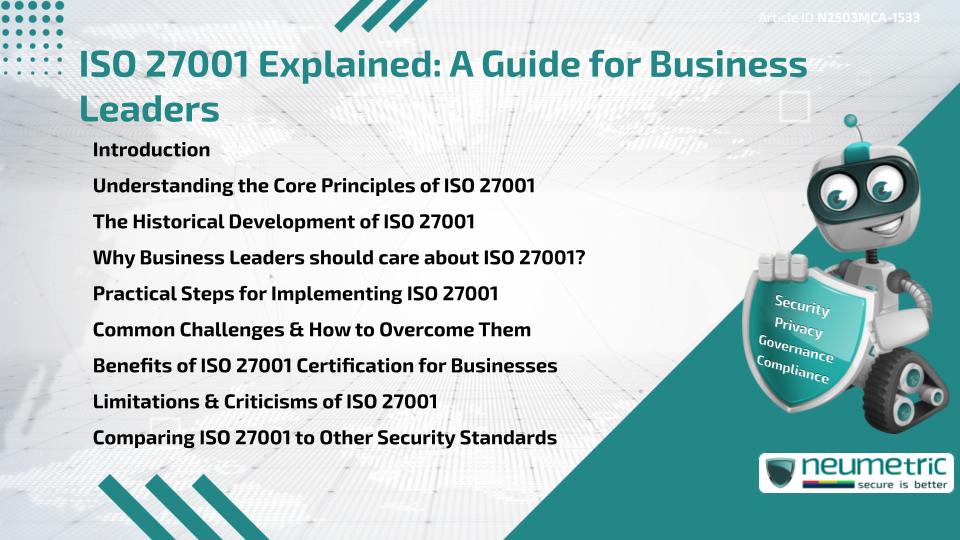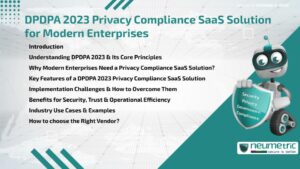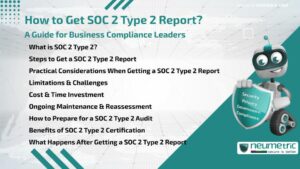Table of Contents
ToggleIntroduction
ISO 27001 explained in simple terms is an International Standard for managing Information Security in Organisations of all sizes. It defines the requirements for an Information Security Management System [ISMS] & provides a systematic approach to managing sensitive Company Data. Business Leaders use it to identify, prevent & address Security Risks while ensuring Legal & Regulatory Compliance.
This guide offers a clear breakdown of ISO 27001’s Core Principles, its historical development, implementation process, challenges, benefits & limitations. It also compares ISO 27001 to other key security standards so decision-makers can make informed choices.
Understanding the Core Principles of ISO 27001
ISO 27001 is built on three key principles – Confidentiality, Integrity & Availability. Confidentiality ensures that information is accessible only to authorised Individuals. Integrity safeguards the accuracy & completeness of Information. Availability ensures that Data & Systems remain accessible when needed.
These principles are implemented through Policies, Controls & Continuous Monitoring, forming the backbone of an effective ISMS.
The Historical Development of ISO 27001
The origins of ISO 27001 can be traced back to the British Standard BS 7799, first published in the mid-1990s. In 2005, the International organisation for Standardisation formalised it as ISO 27001, integrating global input to create a universal standard.
Since then, it has been periodically updated to address evolving Cybersecurity Threats & to align with other ISO Management System Standards such as ISO 9001.
Why Business Leaders should care about ISO 27001?
Cybersecurity Threats are not just IT issues – they are Business Risks that can damage Reputation, disrupt Operations & lead to Legal consequences. For Leaders, adopting ISO 27001 means showing commitment to Data Protection & Operational resilience.
Certification can also offer competitive advantage, especially when working with Clients or Partners who require proof of strong Information Security practices.
Practical Steps for Implementing ISO 27001
Implementing ISO 27001 involves several key steps:
- Conducting a Risk Assessment to identify Vulnerabilities.
- Defining the ISMS Scope.
- Establishing Security Policies & Controls.
- Training Staff & raising Awareness.
- Conducting Internal Audits before Certification.
An effective approach balances thorough Documentation with practical, operational measures.
Common Challenges & How to Overcome Them
Businesses often face challenges such as lack of Leadership support, inadequate Resources or Resistance to change. Overcoming these requires clear communication of ISO 27001’s value, securing Executive Sponsorship & involving Staff in the process from the start.
Maintaining Certification can also be demanding, requiring ongoing Monitoring, Audits & updates to reflect changing Risks.
Benefits of ISO 27001 Certification for Businesses
ISO 27001 Certification delivers tangible benefits:
- Stronger protection against Cyber Threats
- Enhanced compliance with Regulations
- Improved Client & Partner Trust
- Competitive differentiation
- More efficient processes for handling Information
These benefits can justify the investment in both Time & Resources for many Organisations.
Limitations & Criticisms of ISO 27001
Certification requires significant Resources, which can be challenging for Smaller Businesses. Some critics argue that it can become overly focused on Documentation rather than real-world security improvements.
The standard’s effectiveness ultimately depends on the organisation’s commitment to applying it meaningfully.
Comparing ISO 27001 to Other Security Standards
Other standards like NIST Cybersecurity Framework & SOC 2 also focus on Information Security but have different Scopes & Requirements. Unlike SOC 2, ISO 27001 is internationally recognised & applicable across Industries. NIST is often more prescriptive, while ISO 27001 offers flexibility in implementation.
Choosing between them depends on Business needs, Regulatory requirements & Target markets.
Takeaways
- ISO 27001 explained in practical terms shows it as a Framework for protecting Information Assets.
- Business Leaders benefit from understanding its Principles, History & Practical steps.
- Certification can boost Trust, Compliance & Competitive positioning.
- Challenges can be overcome with strong Leadership & Commitment.
FAQ
What is ISO 27001 in simple terms?
ISO 27001 is an International Standard that outlines how to manage & protect an organisation’s information through a structured ISMS.
What are the main differences between ISO 27001 & SOC 2?
ISO 27001 is internationally recognised & focuses on an ISMS, while SOC 2 is primarily for Service Providers in the United States.
Can Small Businesses adopt ISO 27001?
Yes, the Standard can be scaled to suit Businesses of all sizes, though Resource allocation may be a challenge.
Does ISO 27001 cover Physical Security?
Yes, it includes controls related to Physical Security as part of its broader Information Security requirements.
How often must ISO 27001 Certification be renewed?
Certification must be renewed every three (3) years, with annual Surveillance Audits in between.
Is ISO 27001 mandatory for all Businesses?
No, it is not mandatory unless required by contractual obligations or specific Industry Regulations.
How long does it take to implement ISO 27001?
Implementation can take between six (6) months & two (2) years, depending on the size & complexity of the Organisation.
Need help?
Neumetric provides organisations the necessary help to achieve their Cybersecurity, Compliance, Governance, Privacy, Certifications & Pentesting goals.
Organisations & Businesses, specifically those which provide SaaS & AI Solutions, usually need a Cybersecurity Partner for meeting & maintaining the ongoing Security & Privacy needs & requirements of their Clients & Customers.
SOC 2, ISO 27001, ISO 42001, NIST, HIPAA, HECVAT, EU GDPR are some of the Frameworks that are served by Fusion – a centralised, automated, AI-enabled SaaS Solution created & managed by Neumetric.
Reach out to us!





